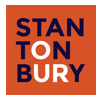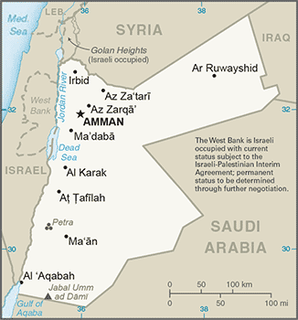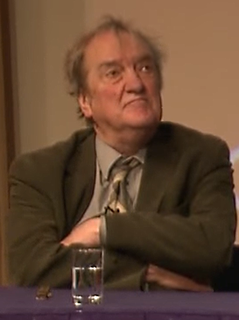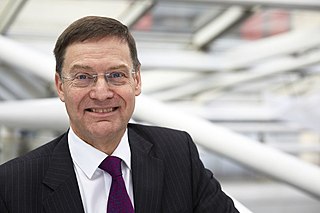Related Research Articles

Distance education, also known as distance learning, is the education of students who may not always be physically present at a school. Traditionally, this usually involved correspondence courses wherein the student corresponded with the school via mail. Today, it usually involves online education. A distance learning programme can be completely distance learning, or a combination of distance learning and traditional classroom instruction. Massive open online courses (MOOCs), offering large-scale interactive participation and open access through the World Wide Web or other network technologies, are recent educational modes in distance education. A number of other terms are used roughly synonymously with distance education.

Education is the process of facilitating learning, or the acquisition of knowledge, skills, values, morals, beliefs, habits, and personal development. Education originated as transmission of cultural heritage from one generation to the next. Today, educational goals increasingly encompass new ideas such as liberation of learners, critical thinking about presented information, skills needed for the modern society, empathy and complex vocational skills.
Science education is the teaching and learning of science to school children, college students, or adults within the general public. The field of science education includes work in science content, science process, some social science, and some teaching pedagogy. The standards for science education provide expectations for the development of understanding for students through the entire course of their K-12 education and beyond. The traditional subjects included in the standards are physical, life, earth, space, and human sciences.
A Bachelor of Education (B.Ed.) is an undergraduate professional degree which prepares students for work as a teacher in schools. In some countries such as Tanzania and Kenya, additional tasks like field work and research are required in order for the student to be fully qualified to teach. It may also be accompanied with or followed by tests for licenses or certifications required for teachers in some areas.
Harris Academy St John's Wood is a secondary school in St John's Wood, North London), that was re-named in 2017. It is a 7 form-entry non-selective co-educational academy. Its predecessor Quintin Kynaston was founded in 1969 by the merger of Quintin Grammar School and Kynaston School. The earlier schools, which were built on the same site, opened in September 1956. It has been an academy school since November 2011. The school was rated as "Outstanding" in 2008 and 2011 by Ofsted, the English schools' inspectorate; however, in 2014 it was rated "Requires Improvement", and in April 2017 it was rated "Inadequate" and as a consequence was placed in special measures. It joined the Harris Federation Multi-Academy Trust in September 2017.
The UK government's Microelectronics Education Programme ran from 1980 to 1986. It was conceived and planned by a Labour government and set up under a Conservative government during Mrs Thatcher's era. Its aim was to explore how computers could be used in schools in the UK. This was a controversial time for Conservative school policies.

Stantonbury School is a coeducational secondary school located in north Milton Keynes, England, established in 1974. It is the second largest secondary comprehensive school in the United Kingdom with more than 1,600 school students aged 11–18, as of January 2020. It is built as part of a community site, including shared facilities including 'Stantonbury Sports & Leisure Centre', 'Stantonbury Theatre', a health centre and a church.

Teacher education or teacher training refers to the policies, procedures, and provision designed to equip (prospective) teachers with the knowledge, attitudes, behaviors, and skills they require to perform their tasks effectively in the classroom, school, and wider community. The professionals who engage in training the prospective teachers are called teacher educators.

Education in the Palestinian Territories refers to the educational system in the Gaza Strip and the West Bank, which is administered by the Palestinian Ministry of Education and Higher Education. Enrollment rates amongst Palestinians are relatively high by regional and global standards. According to a youth survey in 2003, 60% between the ages 10–24 indicated that education was their first priority. Youth literacy rate is 98.2%, while the national literacy rate is 91.1%. Enrollment ratios for higher education were 46.2% in 2007, among the highest in the world. In 2016 Hanan Al Hroub was awarded the Varkey Foundation Global Teacher Prize for her work in teaching children how to cope with violence.

Before the arrival of European settlers, who introduced a formal education system addressed to the elites, education in Ghana was mainly informal and based on apprenticeship. Economic activities in pre-colonial Ghana were based on farm produce shared within households and members of each household specialized in providing necessities such as cooking utilities, shelter, clothing, and furniture, and trade with other households was therefore practiced on a very small scale. As such there was no need for employment outside the household that would have otherwise called for disciplines, values, and skills through a formal education system. After colonization, Ghana's economy became a hybrid of subsistence and formal economy.

The education system of the Hashemite Kingdom of Jordan has been improved consistently since the mid-1900s. The role played by a good education system has been significant in the development of Jordan from a predominantly agrarian to an industrialized nation. Jordan has the highest number of researchers in research and development per million people among all the 57 countries that are members of the Organisation of Islamic Cooperation (OIC). In Jordan there are 8060 researchers per million people, while the world average is 2532 per million.
Science, technology, society and environment (STSE) education, originates from the science technology and society (STS) movement in science education. This is an outlook on science education that emphasizes the teaching of scientific and technological developments in their cultural, economic, social and political contexts. In this view of science education, students are encouraged to engage in issues pertaining to the impact of science on everyday life and make responsible decisions about how to address such issues
Mary James FAcSS retired in January 2014 as Professor and Associate Director of Research at the University of Cambridge, Faculty of Education. In the same year she completed her four-year term as Vice President and President of the British Education and Research Association.
Andrew Pollard is an Emeritus Professor at the Institute of Education, University College London. Formerly, he was Professor of Education at the universities of Cambridge, Bristol and the West of England, Bristol. He chaired the Education Sub-panel for the 2014 Research Excellence Framework on behalf of UK Higher Education Funding Councils, which involves assessing the quality of research undertaken in UK universities. He was Director of the ESRC Teaching and Learning Research Programme from 2002 to 2009, of the UK Strategic Forum for Research in Education from 2008 to 2011 and of ESCalate, the Education Subject Centre of the UK's Higher Education Academy. He is a non-executive director of William Pollard & Co. Ltd. a print and communications company, founded in 1781 and based in Exeter.

Sir Timothy Robert Peter Brighouse is a British educator. He was the Schools Commissioner for London between 2002–2007, where he led the London Challenge.

Chaudhry Faisal Mushtaq, is a Pakistani academic, school practitioner and former caretaker provincial minister for education of the Punjab. He is the founder and Chief Executive Officer of Roots Millennium Schools, Pakistan and is the Executive Director and member of the Board of Directors of the Roots School System.

Professor Sir Chris Husbands is a British academic, educationist, university leader and public servant, who has been Vice-Chancellor of Sheffield Hallam University since January 2016.
The Nuffield Science Teaching Project was a programme to develop a better approach to teaching science in British secondary schools, under the auspices of the Nuffield Foundation. Although not intended as a curriculum, it gave rise to alternative national examinations, and its use of discovery learning was influential in the 1960s and 1970s.
Niki Davis is an educator and researcher based in Aotearoa New Zealand whose work has focused on equipping teachers to effectively deliver information and communication technologies in a global education context. Her research has explored how teaching, learning and assessment can be inclusive and ethically managed in non-traditional spaces involving E-learning while acknowledging the role of the knowledge of indigenous peoples in assisting to build critically reflective research communities. She worked in universities in the United Kingdom and the United States before becoming a Distinguished Professor at the University of Canterbury in 2008, retiring and becoming Professor Emeritus in 2020. Davis has been involved in a range of initiatives and organisations that promote knowledge of digital technologies in education and is widely published in this field.

Educational management refers to the administration of the education system in which a group combines human and material resources to supervise, plan, strategise, and implement structures to execute an education system. Education is the equipping of knowledge, skills, values, beliefs, habits, and attitudes with learning experiences. The education system is an ecosystem of professionals in educational institutions, such as government ministries, unions, statutory boards, agencies, and schools. The education system consists of political heads, principals, teaching staff, non-teaching staff, administrative personnel and other educational professionals working together to enrich and enhance. At all levels of the educational ecosystem, management is required; management involves the planning, organising, implementation, review, evaluation, and integration of an institution.
References
- ↑ "Fellows |". www.acss.org.uk. Retrieved 29 June 2020.
- ↑ "The Gazette". The Gazette (official public record). Retrieved 29 June 2020.
- ↑ Moon, Bob (1986). The 'New Maths' Curriculum Controversy: An International Story. London: Falmer Press. ISBN 1850001227.
- ↑ Moon, Bob (1990). "Patterns of Control: School Reform in Western Europe'". British Journal of Sociology. 41: 423–444. doi:10.2307/590966. JSTOR 590966.
- ↑ Moon, Bob (1976). Stantonbury Campus: A Case Study. Milton Keynes: Open University Press.
- ↑ Moon, Bob (1983). Comprehensive Schools: Challenge and Change. London: NFER-Nelson.
- ↑ Moon, Bob (1997). "Open learning and new technologies in teacher education: new paradigms for development". European Journal of Teacher Education. 20: 7–32. doi:10.1080/0261976970200102.
- ↑ Moon, Bob (1997). "L'Exploitation du potentiel de la formation ouverte et des technologies interactives dans la formation des enseignants" (PDF). Recherche et Formation. 26: 79–97. doi:10.3406/refor.1997.1451.
- ↑ Moon, Bob (1992). "A new routeway into teaching: the Open University and school partnership". Education Review. 6: 28–31.
- ↑ Moon, Bob (1994). "La formación pedagógica en la Open University de Gran Bretána: innovacion y expansiá en los anós 90". Revista de Educación a Distancia. 10: 77–86.
- 1 2 "Queens Anniversary Prize Winners Archive". Queens Anniversary Prize Archive. Retrieved 29 June 2020.
- ↑ "2011 WISE Awards". WISE Awards, Qatar Foundation. Retrieved 29 June 2020.
- ↑ Moon, Bob (2008). "The role of new communication technologies and distance education in responding to the global crisis in teacher supply and training: an analysis of the research and development experience". Educação & Sociedade. 29: 791–814. doi: 10.1590/S0101-73302008000300008 .
- ↑ Moon, Bob (2013). Teacher Education and the Challenge of Development: A global analysis. London: Routledge.
- ↑ Pontefract, Caroline; Moon, Bob (2016). "Teacher education reform and the Palestinian refugee community". In McLaughlin, Colleen (ed.). Making a Difference: Turning Teacher Learning Inside Out. Cambridge: Cambridge University Press.
- ↑ Moon, Bob (2016). Do Universities Have a Role in the Education and Training of Teachers? An International analysis of policy and practice. Cambridge: Cambridge University Press.
- ↑ Villet, Charmaine; Moon, Bob (2017). Digital Learning: Reforming Teacher Education to Promote Access, Equity and Quality in Sub-Saharan Africa. Vancouver: Commonwealth of Learning.
- ↑ "Global education pioneer Professor Bob Moon awarded CBE". Open University News. Retrieved 29 June 2020.
- ↑ National Commission on Education (1993). Learning to Succeed; A Radical Look at Education Today and a Strategy for the Future. London: Heinemann.
- ↑ Kidson, Marc; Norris, Emma (2015). Implementing the London Challenge. Institute for Government. p. 2.
- ↑ Brighouse, Tim (12 May 2020). "Like the Open University we now need an open school for the whole country". The Guardian. Retrieved 29 June 2020.